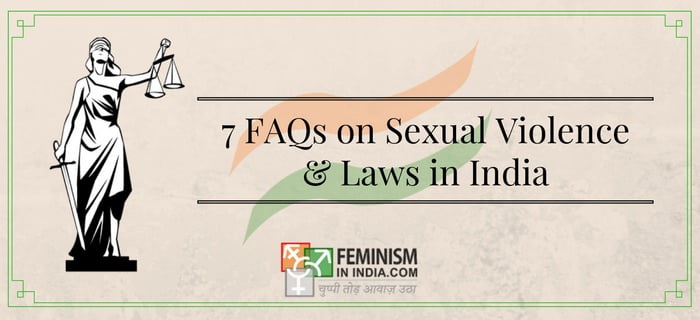In a recent engagement with people in the comments section of the Facebook page of Feminism in India, it dawned on me that while sexual violence and advocacy for the survivors is a concern for most readers, many readers have questions about legal provisions in India relating to sexual violence. Questions that popped up, included fundamentals like: Exactly what is rape? Are rape laws gender neutral? Does rape require penetration?
Laws are constantly evolving and the criminal justice system often witnesses the complex interplay of many laws, in any given case. Lawyers need to keep themselves updated and study the facts of a case before coming to a legal opinion.
However, for lawyers and non-lawyers alike, who want to have conversations about sexual violence, the law on sexual violence is a very important component. To enable meaningful conversations on the law, everyone, must have access to information on fundamental questions. To that end, this article is a modest attempt at some sort of ‘F.A.Q’, on laws relating to sexual violence in India. Given the fact that this is a large topic, the posts will be divided up in parts.
This part, will focus on ‘Rape’ as defined in Section 375 of the Indian Penal Code (Sometimes, as and when relevant it will touch upon some other laws, other Sections, and particularly the POCSO Act).
FAQ 1: Who can commit rape, under the purview of the IPC?
The language of Section 375 of IPC is clear. It begins with ‘A man is said to commit rape if…’
In so prefacing the definition of Section 375, it is clear that in the Scheme of the Indian Penal Code, the perpetrator of rape can only be a man.
However, as far as child victims of sexual abuse are concerned, the Protection of Children from Sexual Offences Act, 2012, is gender neutral. The offence of penetrative sexual assault (defined in Section 3 of the POCSO Act), is materially equivalent to the offence of rape, as defined in the Indian Penal Code. In case of child sexual abuse, both the victim and the perpetrator can be male or female, and it is in this context that female perpetrators are recognized by the law.
FAQ 2: Who can be the victim of rape, in the eyes of the law?
Section 375 of the Indian Penal Code only recognizes women as survivors of rape. The POCSO Act does recognize that any child (irrespective of gender) can be the victim of penetrative sexual assault. However, this leaves out adult male survivors of penetrative sexual assault, who the law does not recognize, as victims of rape.
Adult male survivors of penetrative sexual assault, as a category, are left out of the ambit of Section 375 of the IPC. It is a glimpse into the patriarchal construct of our laws that an adult male survivor of penetrative sexual assault will have to take recourse to Section 377 of the Indian Penal Code, a relic from a rather draconian past that seeks to punish ‘carnal intercourse against the order of nature’ and does not differentiate between consenting adults and non-consenting participants. This creates a tragic legal fiction that deems that ‘men can be sodomized but not raped’.
FAQ 3: What acts are required to constitute the act of rape? Is penetration necessary?
Before 2013, the law did not recognize as ‘rape’ incidents of forced anal penetration, or oral sex. This led to an anomalous legal position where if someone was forced to have anal sexual intercourse, they could only be charged under Section 377 of the IPC, and not for rape. This had a significant impact on the Aruna Shanbaug case, where the perpetrator was never charged under Section 377 IPC, reportedly to save the fiancé of the victim from ‘embarrassment’. The perpetrator was convicted or attempted murder and robbery.
With the Criminal Law Amendment Act of 2013, the ambit of the term rape in the IPC was broadened to include many categories other than ‘penile-vaginal’ penetration. Four categories of actions are recognized as constituting rape, when done without the consent of the woman:
|
|
|
|
FAQ 4: What does consent mean?
Section 375, goes into great detail on the question of consent. When an act falling within any of the four categories is done, under any of the following conditions, it constitutes rape:
Conditions under which the 4 categories of acts constitute rape.
- Against the will of the woman.
- Without her consent.
- With her consent, when her consent has been obtained by putting her or any person in whom she is interested in fear of death or of hurt.
- With her consent, when the man knows that he is not her husband, and that her consent is given because she believes that he is another man to whom she is or believes herself to be lawfully married.
- With her consent, when, at the time of giving such consent, by reason of unsoundness of mind or intoxication or the administration by him personally or through another of any stupefying or unwholesome substance, she is unable to understand the nature and consequences of that to which she gives consent.
- With or without her consent, when she is under eighteen years of age.
- When she is unable to communicate her consent.
Ok, but what does consent mean?
Consent, as laid down in Section 375 of the IPC, means an ‘unequivocal voluntary agreement’ when the woman by ‘words, gestures or any form of verbal or non-verbal communication’, communicates willingness to participate in the specific sexual act.
The Indian Supreme Court has clarified that ‘against her will’ and ‘without her consent’, are two distinct categories, though there might be an area of overlap between then. The phrase against her will, connotes an act of sexual intercourse committed despite a woman’s resistance and opposition. Consent on the other hand, according to the Indian Supreme Court, implies an act of reason accompanied by deliberation.
The Indian Penal Code makes it abundantly clear that the fact of a woman not physically resisting the act of penetration shall not by the reason only of that fact indicate consenting to the sexual activity. Merely submitting to sexual assault (for example due to fear), without putting up a physical resistance, does not amount to consent.
It might be interesting here to mention the Mathura case, a case that remains a blot on Indian legal history. This 1972 case involved the custodial rape of a tribal girl, by two police constables. The alleged perpetrators were acquitted by the Hon’ble Supreme Court of India. The decision betrayed a confusion about the difference between submitting to an act of sex, and consenting to it.
In inferring that the 16-year-old girl ‘consented’ to the activity, the court relied upon factors such as “stiff resistance having been put up by the girl is all false” and the “alleged intercourse was a peaceful affair”.
In an open letter, written to the Chief Justice of India, by leading Indian academics (it is worth a read and can be found here) the underlying assumptions of this judgment were challenged. One paragraph of this letter, hits the nail on the head with regard to the meaning of consent, and I have quoted it below:
“There is a clear difference in law, and common sense, between ‘submission’ and ‘consent’. Consent involves submission; but the converse is not necessarily true. Nor is absence of resistance necessarily indicative of consent. It appears from the facts as stated by the Court and its holdings that there was submission on the part of Mathura. But where was the finding on the crucial element of consent?”
Let us now look at some other questions that are frequently asked on the issue of rape, particularly about the quantum of punishment for it.
Also Read: Why Aren’t We Talking About Sexual Consent In India?
FAQ 5: What is the punishment for rape? Is there a more severe punishment for rape committed in certain circumstances?
| Offence | Punishment | Relevant Section |
| Rape | Not less than seven years, may extend to life, with fine. | See Section 376 IPC |
| Rape by a) Police officer -1) Within police station -2) Premises of any station house -3) On a woman in the custody of the police officer or his subordinate b) A public servant on a woman in his or his subordinate’s custody c) A rape committed by a member of the armed forces deployed in an area by the Central or State Government, in such an area. d) Rape committed by a person in the management of or staff of a hospital, remand home, jail, women’s institution, children’s institution, or any such place of custody. e) Rape committed by a relative, guardian, teacher, or a person in a position of authority over the woman f) Rape committed during communal or sectarian violence g) Rape committed on a woman, knowing her to be pregnant. h) Rape committed on a woman under sixteen. i) Rape committed on a woman who is incapable of giving consent. j) Rape committed when the perpetrator is in a position of control or dominance over the woman k) Rape committed on a woman suffering from a mental or physical disability. l) Rape committed on the same woman repeatedly m) Causing grievous hurt, disfigurement, maiming, or endangering the life of a woman during the commission of rape. | Rigorous imprisonment for not less than ten years, which may extend to life (which shall mean the remainder of that person’s natural life) and fine | See Section 376 IPC |
| Persistent vegetative state or death caused in the commission of rape | Not less than 20 years, may extend to life (which shall mean the remainder of that person’s natural life) or with death | See Section 376 A |
| Gang-rape | Not less than 20 years, may extend to life (which shall mean the remainder of that person’s natural life) and fine | See Section 376 D |
FAQ 6: What is a gang-rape? Does each member of the group or gang have to commit sexual assault in order to face punishment?
Section 376D of the Indian Penal Code lays down that ‘Where a woman is raped by one or more persons constituting a group or acting in furtherance of a common intention, each of those persons shall be deemed to have committed the offence of rape and shall be punished ….’
This provision for gang-rape recognizes that it is not necessary for each person in the group to actually commit the crime of rape, to have high degree of culpability. The law penalizes any activity done in furtherance of the common intention of the group as if it was the offence of rape itself. This would mean that even persons who stand guard over doors, or hold the victim own cannot get away with a lighter punishment by claiming that they did not actually commit the sexual assault.
FAQ 7: Is there a more severe punishment for repeat offenders?
Section 376E of the Indian Penal Code states that whoever has been previously convicted of an offence punishable under Section 376 or section 376A or section 376D (i.e. committing rape, causing death or vegetative state in the course of committing rape or committing gang-rape) and is subsequently convicted of an offence punishable under any of the said sections shall be punished with imprisonment for life (which shall mean imprisonment for the remainder of that person’s natural life) or with death. Note that this section requires a previous conviction to be present, followed by a subsequent conviction.
These are some questions on rape and the law that we thought were relevant. As mentioned before, this body of law is large, and some things can get left out, keeping in mind the demands of brevity and readability. If there was something you wanted to know, that we have not addressed, feel free to shoot out more questions, and we will try to answer them to the best of our abilities.
We welcome your questions in the comments section.
About the author(s)
Srishti Agnihotri regularly appears in Trial Courts, the Delhi High Court and the Supreme Court of India. She is involved in research and advocacy on women's rights and child rights. She completed her Masters in International Human Rights Law from the University of Notre Dame, USA.





What di you have to say about “Rape on the promise of marriage”?, Do you believe that consent can be withdrawled after the act?